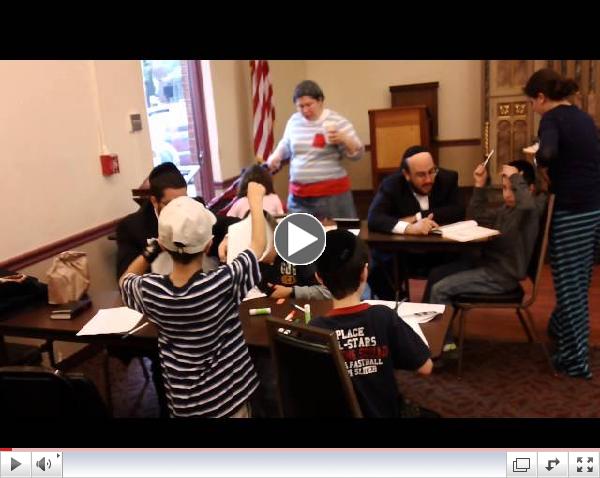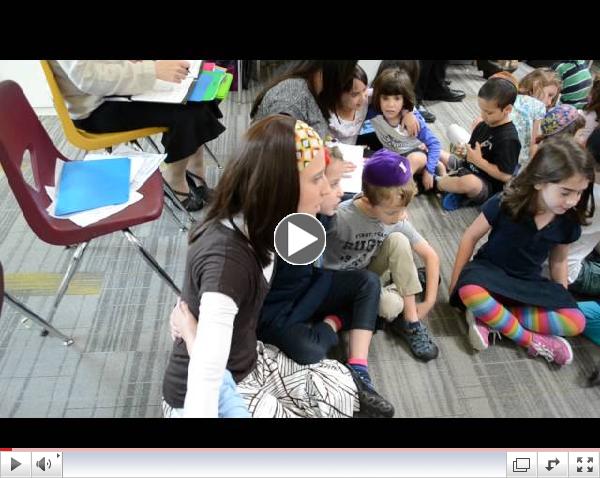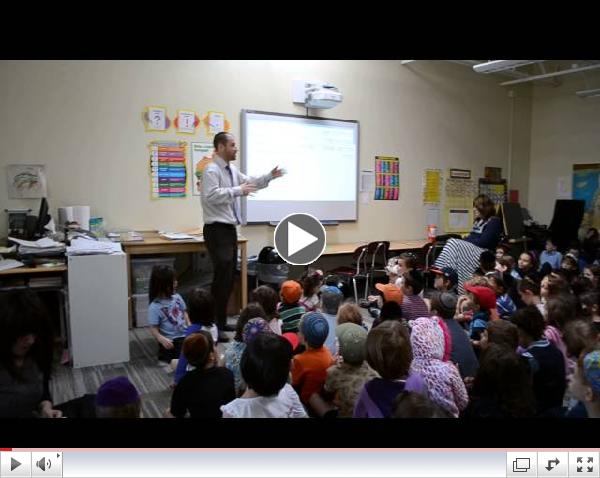|
The Hillel Happenings
The Official e-Newsletter of Hillel Academy of Pittsburgh
|
|
|
|
|
September 24, 2014
29 Elul 5774
Rosh Hashana
&
Parshat Ha'Azinu
Shabbat Shuva
Candle Lighting Time:
Wednesday - 6:56 pm
Thursday - 8:02 pm
Friday - 6:52 pm
Havdallah: 7:59 pm
|
|
Letter from the Editor
by Reb Danny Shaw
As we enter 5775 and say good-bye to 5774, we wanted to begin the year with a different type of Hillel Happenings. This one is focused around Divrei Torah from a few of our teachers and administrators. This compilation of essays is unique because all different types of learners can relate to these Divrei Torah. Children in our younger grades all the way through people who have been learning for years can benefit from them. Rest assured that the Hillel Happenings will be back in full force the following week.
We here at the HH thank all of you for reading each week and for your comments. Thank you for making the HH a successful mode of communication between the school and our stakeholders.
I want to wish everyone a K'tiva V'Chatima Tova!
|
|
Symbolism of the Shofar
by Rabbi Sam Weinberg - Head of School
In Masechet Rosh Hashana (32a) the Talmud cites a Berayta which obligates us to recite "zichronot - remembrances" and " shofars - shofers." This obligation is fulfilled through the sections which we add to our Mussaf service on Rosh Hashana. Zichronot mentions the idea that G-d remembers our actions as well as His covenant with our Avot, Avraham, Yitchak, and Yaakov. Shofarot speaks to the symbolism of the Shofar, specifically in its role at Har Sinai and in our future redemption. It is puzzling why we have separate obligations to not only listen to the sound of the shofar, but also to recite verses which describe its symbolism. How can we understand these two distinct requirements?
The Netziv (19th century Warsaw) explains in his sefer "Ha'erech Hadavar" (Vayikra 23:24), that Hashem judges the world on Rosh Hashana on two levels: the individual level and the national one. We stand trial as individuals who come before G-d's heavenly court and we also stand trial as a nation. The mitzvah of Shofar is meant to stir individuals to Teshuva and to trigger a process of introspection. In this way, the Shofar exists in the individual realm. The "shofarot" section of our prayers focuses on the unique relationship between Hashem and Am Yisroel. In this way, we use the symbolism of the Shofar to beseech Hashem to protect us as a people.
This year has been a very difficult one for the Jewish people and the world at large. Our enemies have become more emboldened and our allies more uncomfortable offering their support. This Rosh Hashana it is so important that we have the needs of Am Yisroel in mind and not just our own. We at Hillel wish everyone a happy and healthy new year, and may we all individually, as a community, and with all of Klal Yisroel, be inscribed in the book of life.
K'tiva V'Chatima Tova!
|
|
|
|
|
|
|
|
|
|
Come hear your choice of shiurim given by leaders in our community. Each night's presentation will be given consecutively and will be 15-20 minutes of interactive learning relating to Rosh Hashanah and Yom Kippur. Open to men and women; refreshments will be served.
!שנה טובה ומתוקה
Tonight and Tuesday, September 30 @ 8:30 pm at Hillel Academy come hear Rabbi Silver & Rabbi Sutofsky HYPE Lectures -Tzedakah - Click HERE to RSVP
|
Out of the Depths
by Mrs. Elky Langer, Curriculum Coordinator
"A song of ascents, from the depths I called You, Hashem." These emotional words of Tehillim (Psalm 130) are added by many people to our tefillos during the Ten Days of Repentance, from Rosh Hashana through Yom Kippur. The Psalm speaks longingly of our yearning for G-d's repentance, acknowledging that it is only due to Hashem's kindness that we are given the gift of teshuva - the ability to transform ourselves anew and reconnect to Him in purity.
At the moment when the world's fate is being decided for the upcoming year - when the future for every individual hangs in the balance - we recognize that our only hope lies in the power of repentance. How can we merit the granting of this special gift during these awesome days of judgment? The answer lies in the opening statement of this Psalm.
"From the depths I called You, Hashem." Deep inside every one of us is the desire to do Hashem's will, to keep the mitzvos and observe His laws. This spark of holiness defines who we truly are. In our quest for teshuva, we ask Hashem to look beyond the externals. Do not judge us by the actions that misrepresent our true selves. Look at the purity within, see our potential, and grant us life and the ability to fulfill that potential. Is teshuva really that simple? Of course, there's a catch. If we want Hashem to extend us credit for the possibilities inherent in our potential, we need to demonstrate that we're interested in actualizing that potential. Have we worked out a plan to connect with that potential? Have we found a way to touch that internal spark? Do we have a strategy ready that will help us bridge the gap between our internal holiness and our external actions, so we can begin performing in accordance with the strength that lies within us?
This is our task during the week that lies ahead, the Aseres Yemei Teshuva. As we present ourselves before the court of Heavenly judgment, we have the opportunity to plead our case - the case for life, for health, for sustenance, for peace; for ourselves, our families, our communities and the Jewish nation. When we take concrete steps - small, perhaps, but planned and targeted to bring out our internal goodness - we demonstrate that we are truly sincere in our desire to become the people we are meant to be.
And as we pledge to live our lives in fulfillment of Hashem's service, we prove ourselves to be worthy of the gift of repentance.
May we all merit experiencing the final words of this Psalm: "And He will redeem Israel from all their sins."
|
|
|
|
|
Hillel on YouTube - The Video Center
|
 | | HYPE Family Learning Kick-off - 9/21/14 |
 | | September Pre-Shabbat Oneg |
 | | Pre-Shabbat Oneg - Rabbi Weinberg's Weekly Story |
|
|
מעביר על מדותיו
by Rabbi Yisroel Smith, Vice Principal, BHS
Often times students ask me for a trick or shortcut to merit a good judgement. While I wouldn't say I have a shortcut, an important lesson can be learned from the following Gemara:
The Gemara in Maseches Taanis 25b records an incident that occurred one year during a particularly bad drought. The Gemara tells us that Rebbe Eliezer led the congregation and recited 24 Brachos but he wasn't answered and the drought continued. However, when Rebbe Akiva led the congregation, all he said was "Our Father, our King: we have no king beside You. Our Father, our King: for Your sake have mercy on us," and immediately he was answered and it began to rain. This caused a large debate to break out amongst those assembled, questioning Rebbe Eliezer's greatness until a Heavenly Voice called out and said, "I didn't answer Rebbe Akiva because he was greater than Rebbe Eliezer, rather it was because Rabbe Akiva is מעביר על מדותיו and Rebbe Eliezer is not."
The expression "מעביר על מדותיו" is normally understood to refer to someone who doesn't get upset when someone does something wrong to him-that he is overcoming his natural inclination to take revenge. According to this explanation the Gemara seems to make little sense as if it's true that Rebbe Akiva overcomes his natural inclination and Rebbe Eliezer doesn't then this seems to be a reason that Rebbe Akiva is, in fact, greater. How can we understand this Gemara?
The עץ יוסף explains that really Rebbe Akiva and Rebbe Eliezer responded to personal slights in the same way, with neither letting it bother them. However, one needs to look at their background to truly understand this Gemara. Rebbe Akiva was a convert and did not grow up in a house that was imbued with Torah's sensitivities towards others. Therefore, when he looked the other way, he was overcoming all of the bad habits he had learned in his youth. Rebbe Eliezer, on the other hand, had grown up in a Torah home and it was more natural for him to look the other way when someone would wrong him.
It turns out that we have two people who seem to respond the exact same way to when one wrongs them, yet, because of their backgrounds, they are not the same at all. I believe that if people who act the same are actually quite different, then all the more so should people who act differently be judged differently. It would seem that it is vital whenever we interact with others to take their background into consideration and, more often than not, this will help us understand others and treat them in a much more appropriate way.
In doing so, may we all merit to be written and sealed in the book of life.
כתיבה וחתימה טובה
|
|
Ma'avir Al Midosav
by Rabbi Mordecai Rosenberg - Middle School and High School Rebbe
On Rosh Hashana and during the Aseres Yemaei Teshuvah, we request from Hashem to "remember us for life," and inscribe us for a good year. The concept of our asking for a good year is problematic. If we truly deserve this good inscription, then Hashem will surely inscribe, and if, Heaven forbid we don't deserve this, then with what merit can we expect that Hashem will change our deserved outcome? Why do we even request this?
Rav Chaim Friedlander in his work Sifsei Chaim explains that even though one cannot expect to receive something not due to him, the criteria for the judgement is not the same for everybody. The Gemara says that if someone is ma'avir al midosav, doesn't demand that everyone do for him exactly what he has rights to, and concedes privileges for the sake of keeping peace, then in Heaven the response is to treat him the same way. His or her verdict is not going to be so exacting. This is our request to Hashem. Even if we are not totally deserving, but since we offer leeway to others, then Hashem will demonstrate flexibility as well.
|
The Shofar
by Mrs. Anna Yolkut - Third Grade Teacher
Have you ever seen a straight shofar? We are very used to the shofars that we use, which usually come from rams, and are always at least a little bent, or even very curvy. But a kosher shofar could come from a different kosher animal, like the Gemsbok, a type of antelope, which has very straight horns. The Rabbis of the Gemara, many years ago, already discussed this issue and decided that it is best to use a curved shofar.
There is another disagreement-- about how we should stand during davening on Rosh Hashana. Should we stand straight and tall and proud? We ARE declaring that Hashem is our King after all! Or should we be bent over and humble, since we are davening for our whole year, and are afraid of what our judgement might be?
The answer to both questions is the same--we are bent over, and our shofars are bent, to remind us to be humble, and realize that we are very small, and Hashem is VERY great.
However, you might think that this means that Rosh Hashana is supposed to be a sad and scary day. Actually, there is also a mitzvah of simcha on Rosh Hashana! Even though it is a serious day, we are happy. We are celebrating so many things--a new year, the opportunity and gift that Hashem gives us to do Teshuva, and the fact that we KNOW that Hashem will judge us fairly, even if we don't always understand how.
We show our simcha by singing, eating special foods, wearing nice clothes etc. These things aren't a distraction from the main ideas of Rosh Hashana--the Shofar, Teshuvah, and Tefillah. Rather, showing and experiencing Simcha, happiness, is another important way to fulfill the purpose of Rosh Hashana and connect to Hashem.
|
 | |
Craig Jahkne, beekeeper and
honeymaker came to school last week.
|
 | |
Morah Leah Ackner shows her students how to peel apples for Rosh Hashana (or for any
other time).
|
 | |
Kindergarten prepares to bake honey cookies.
|
|   | |
Third grader, Avi Admon made this unique Hillel creation out of clay. Thank you Avi!
|
 |
|
|
|
Announcements and Reminders
|
- Keser Torah Sunday mornings at 8:30am. Davening followed by learning, coffee and cake at Hillel Academy of Pittsburgh. All are invited!
- NCSY: :
1) On the first day of Rosh Hashana in the PZ education building there will be an NCSY Teen Rosh Hashana
2) There will be a Jr NCSY Sucah Party and scavenger hunt on Sunday Oct 12.
3)Lastly, there will be a Jr NCSY Sucah Party on Monday Oct 13. explanatory minyan and lunch. This event is open to all teens and will begin at 10:30am.
-
DON'T BE LEFT OUT - Last call for information for the 2015 edition of the Jewish Women's League Community Directory. Be sure that you have made any changes to your information, that we have your contact information if you are new in town, or that we have your advertisement. Contact Judy Mendelson, 412-521-6498, jnm514@verizon.net. DEADLINE: October 15, 2014.
|
|
|
|
5685 Beacon Street - Pittsburgh, PA 15217
|
|
|